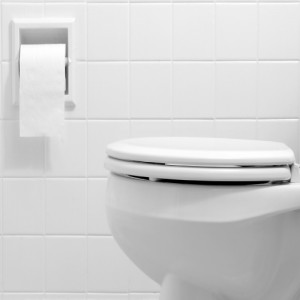In this article, we will show you ways by which you can diagnose and repair different toilet problems as slow flushing, blocked toilets, running or slow-fulling toilets, odors and loose wobbly toilets.
Possible problems and their solutions

Human waste, feces and urine are normal things that should be disposed of in a sanitary way by all modern toilets.
The developments of flush-toilets by the late 1800’s have replaced using outhouses and chamber pots. The modern toilets rely on an amount of water to flush the waste into the sewage piping or sometimes into a private septic system.
You might bump into the term water closet and this is just another way to refer to a toilet.
The first flush toilets were using a reservoir tank which was mounted on the wall (sometimes it was wooden). This was used to bring the right amount of pressure and flow rate in order to empty and clean the bowl.
When we are talking about contemporary toilets, we can see that the tank is attached to the bowl itself.
This relies on the effectiveness of the flush valve controls in order to bring the flow rate to clean and empty the bowl.
There are various toilet problems. Some of those can be fixed quite easily, though other may require a more thorough inspection and fix.
One simple step you can take in order to diagnose the problem is taking off the tank top of the toilet. Lift it and put it in a safe place where you won’t break it or harm yourself by tripping over it. The toilet seat is not the right place to put the top on as you can break the seat itself and it is in your way of fixing the toilet.
Tank reservoirs have been quite the same since the 1940s though there are some improvements made in the fill or flush valves, water saving and floats.
The cycle goes like: there is a flush lever which is moving an arm in order to lift the tank ball or flapper valve to allow the water to fill the toilet bowl and wash the waste in the sewer pipe. Then the float arm or another float which is vertically moving, opens the valve in order for the toilet to be refilled with water. When the water level has reached the proper amount, the toilet tank fill valve is closed by the float.
The toilet is not flushing …?
If you flushed the toilet and nothing happened there is two things you could do.
• First, check is there is any water in the toilet tank. If there isn’t any water, probably the water has been turned off. Also the water pressure might be lost or the valve which is supplying the toilet with water might be closed.
• The second thing you should check is if the flush lever is connected to the flapper valve of the toilet tank which is located at the bottom of the tank. Usually if you push the lever down or to a side, you should move an arm in the toilet tank.
There is a chain, wire, plastic strip or a string at the end of this arm. This chain goes to a connection with an edge of the flush or flapper valve of the tank.
If you move the flush lever, this should release the flapper valve and release the water to flow from the toilet tank down the bowl. You should check if those connections are put in the right place and if the flapper is lifted before you push the flush lever. If there is a need, reconnect the chain.
If the toilet tank flapper has opened and the water was flowing down the bowl but it didn’t drain …
You might be dealing with a blocked toilet drain.
If you see that the toilet might overflow any minute, you might be able to stop it before you get all that waste and water all over your floor. What you should do is reaching in the tank and pushing the flapper valve shut. This way you will stop the water from flowing in the bowl.
If you need professional help contact us on 0412 738 874 or leave a message.
We are the experts to call for blocked drains in Melbourne, leading sewer plumber in Melbourne, emergency plumbing and drain cleaning experts.
Helpful details for a Blocked Drain, Emergency Plumber and Drain Cleaning situation:
Triple zero – 000
City of Melbourne – Floods and Storms
VicWater
Yarra Valley Water
Victoria State Emergency Service

